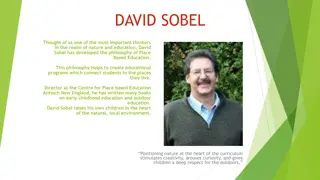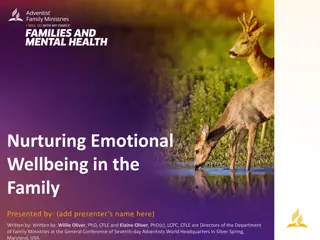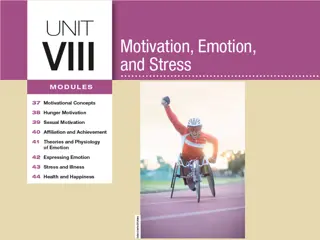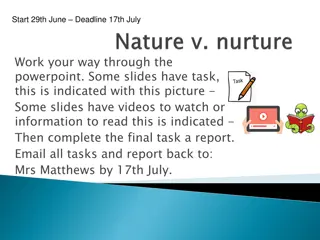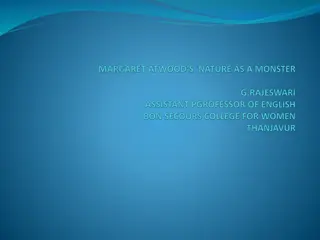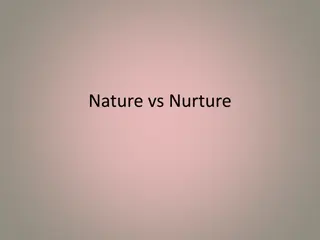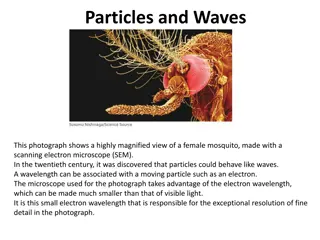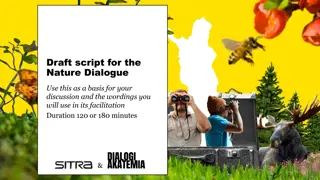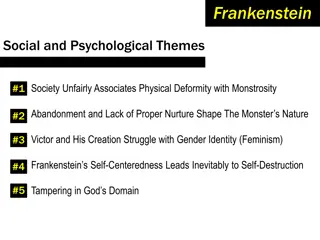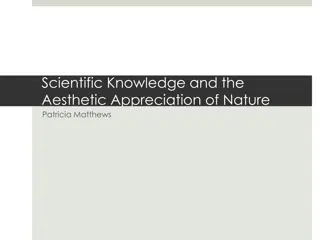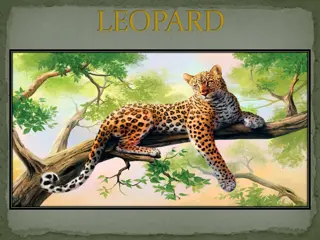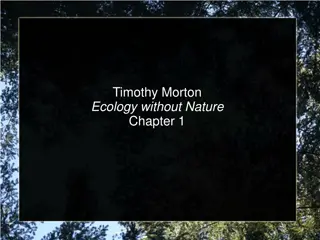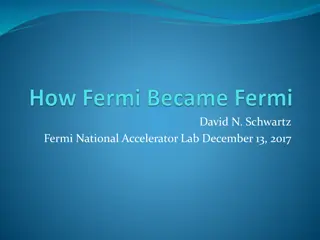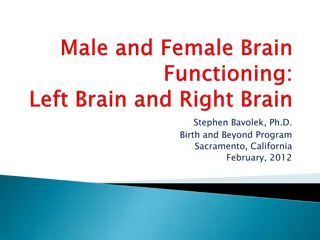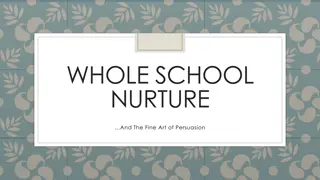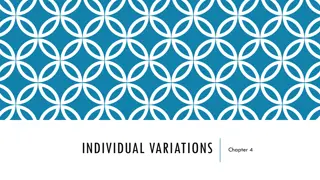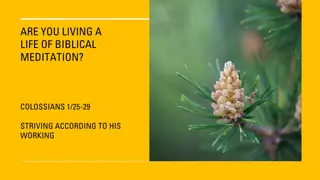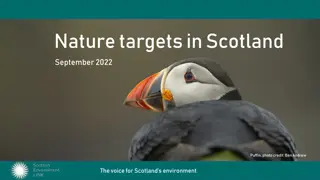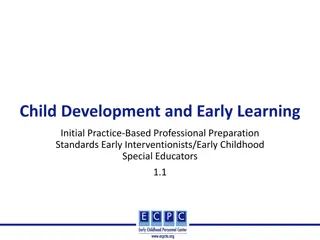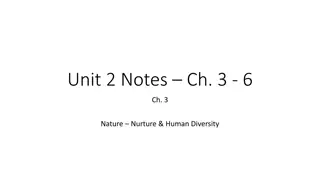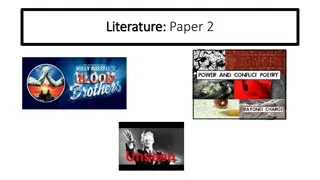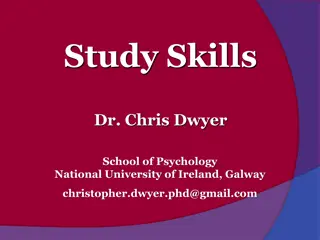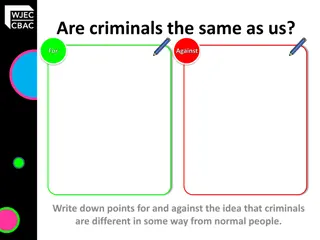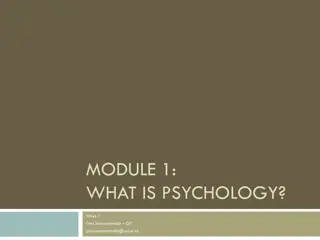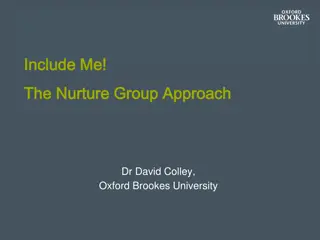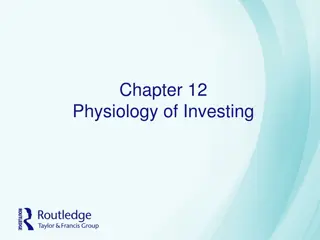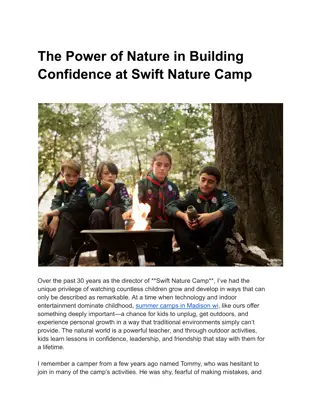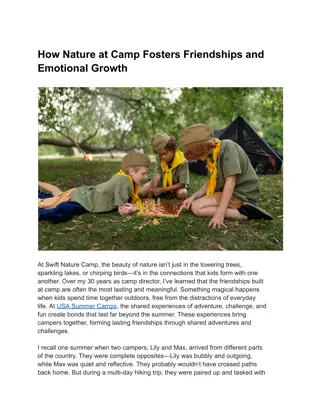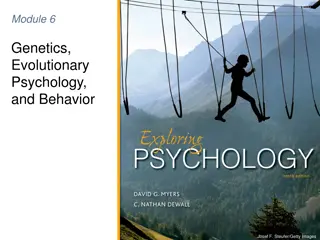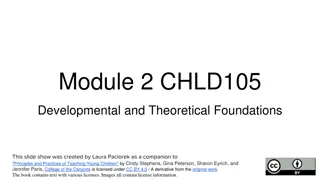Understanding the Enneagram for Intentional Christian Relationships
The Enneagram is a personality system rooted in ancient Christian traditions, now widely used for understanding individual traits and behaviors in modern times. Developed from the concept of nine points representing different personality types, it is a tool to explore vices, virtues, and personal gr
4 views • 10 slides
Understanding Socialization: Process, Importance, and Agents
Socialization is the process through which individuals adapt to society, internalize its values, and acquire proper behavior. It involves stages like primary and secondary socialization, influenced by theorists like Erikson and Piaget. Agents like family, peers, and institutions play key roles in sh
2 views • 22 slides
Inspiring Nature and Education: The Philosophy of David Sobel
David Sobel, a prominent thinker in nature and education, advocates for Place-Based Education, connecting students with their local environment. Through his 7 Design Principles for Children and Nature, he underscores the importance of adventure, fantasy, imagination, and animal allies in fostering h
0 views • 13 slides
Nurturing Emotional Wellbeing in the Family Seminar
This seminar explores the impact of family dynamics on individuals' social, mental, emotional, and spiritual wellbeing. Recommendations from psychological, biblical, and spirit of prophecy perspectives are provided to nurture holistic wellbeing in the family environment. Challenges faced and nurturi
3 views • 27 slides
Understanding Motivation: Perspectives and Theories
Define motivation in psychology and explore different perspectives used to study motivated behavior. Learn how needs drive behavior, the interplay between nature and nurture in motivation, and the perspectives psychologists have used including drive-reduction theory and instinct theory. Delve into t
1 views • 32 slides
The Debate of Nature vs. Nurture in Personal Development
The nature vs. nurture debate in personal development explores the influence of genetic and biological factors (nature) compared to social, economic, and environmental factors (nurture). It raises questions on whether genetics or environment plays a stronger role in shaping behaviors, intelligence,
0 views • 14 slides
Nature as a Monster in Canadian Literature
Margaret Atwood, a renowned Canadian author, explores the theme of nature as a monster in Canadian literature. The prose delves into the changing perceptions of nature by poets over the centuries, from a kind mother figure to a hostile force. The discussion includes the different types of death port
1 views • 9 slides
Exploring Nature vs. Nurture: Genetic Inheritance and Socialization Effects
Discover the interplay between genetic inheritance and socialization effects in shaping human characteristics through various case studies and research articles. Explore how traits are passed down from parents and how environmental factors influence personality development. Delve into intriguing top
0 views • 6 slides
Dual Identities: A Reflection on Duality in Dr. Jekyll and Mr. Hyde
Explore the complexities of human nature through the contrasting personas of Dr. Jekyll and Mr. Hyde, as depicted in the classic tale. Delve into themes of duplicity, moral degeneration, and societal influences. Engage in thought-provoking discussions on the impact of nature versus nurture and the c
0 views • 6 slides
Exploring the Dual Nature of Particles and Waves in Physics
This collection of images and information delves into the intriguing concept of the dual nature of particles and waves in the field of physics. From the historic Young's double-slit experiment demonstrating the wave nature of light to Louis de Broglie's groundbreaking work assigning a wavelength to
3 views • 15 slides
Nature Dialogue: Understanding the Relationship Between People and Nature
Explore the diverse connections individuals and organizations have with nature, discussing its significance in biodiversity conservation. Facilitate open discussions to inspire contributions towards conserving biodiversity. Emphasize the importance of personal and collective actions in preserving na
3 views • 15 slides
Themes of Society and Psychology in Frankenstein
Society unfairly associates physical deformity with monstrosity in Mary Shelley's novel, Frankenstein. The abandonment and lack of proper nurture shape the monster's nature, while Victor and his creation struggle with gender identity. Frankenstein's self-centeredness leads to self-destruction, and t
0 views • 14 slides
Exploring the Relationship Between Scientific Knowledge and Aesthetic Appreciation of Nature
This discourse delves into the dynamic interplay between scientific understanding and aesthetic appreciation of nature. It discusses varying perspectives on the aesthetic value of nature, the necessity of scientific knowledge in categorizing nature, and criticisms regarding the relevance of informat
0 views • 33 slides
Reflections on Life and Nature: A Study of Longfellow's Poems
Exploring themes of life, nature, and mortality in Henry Wadsworth Longfellow's works "The Tide Rises, The Tide Falls" and "A Psalm of Life." The poems delve into the inevitability of death, the enduring power of nature, and the meaningfulness of life's purpose. Through vivid imagery and poetic devi
0 views • 21 slides
Green Youthworks Initiative: Connecting Youth to Environmental Careers
Explore the Green Youthworks initiative in Baltimore, aimed at expanding environmental career exposure for youth. Learn about Cities Connecting Children to Nature, current YouthWorks programs, best practices in working with youth, and the importance of nature connections. Discover how Baltimore City
1 views • 15 slides
The Fascinating World of Leopards
Leopards, with their well-camouflaged fur and adaptable nature, thrive in the wild. They are solitary predators known for their opportunistic hunting behavior, broad diet, and ability to move heavy prey into trees. Unlike lions, leopards do not live in groups, and adult males live separately from fe
0 views • 8 slides
Rethinking Ecology: Nature's Role in Human Society
Timothy Morton's "Ecology without Nature" challenges the traditional concept of "nature" and its interference with ecological progress in society. Through thought-provoking narratives and philosophical perspectives, Morton argues for a reevaluation of our relationship with the environment, emphasizi
3 views • 23 slides
Understanding the Importance of Heredity and Genetics
Exploring the essential concepts of heredity and genetics, this content delves into the interplay between nature and nurture, the role of genetic code and DNA, and the mechanisms of inheritance. It highlights how genes influence behavior and the distinction between genotype and phenotype. Through vi
0 views • 21 slides
Wellbeing Day - Activities to Nurture Mental Wellbeing
Wellbeing Day is a time to focus on mental health and recharge through activities like painting rocks, connecting with nature, practicing actions for happiness, enjoying a picnic outdoors, and sharing hugs for a sense of connection and positivity.
0 views • 16 slides
The Fascinating Life and Work of Physicist Enrico Fermi
Enrico Fermi, a renowned physicist, made significant contributions to the field of quantum mechanics and nuclear physics. Born in Rome in 1901, he went on to receive the Nobel Prize in 1938 for his work on slow neutrons. Fermi's innovative approach as a theorist and experimenter set him apart in the
0 views • 16 slides
Understanding the Brain: Key Components and Functions Explored
Explore the intricate workings of the brain, from the essential role of the brainstem in vital functions to the coordination by the cerebellum and the emotional control of the limbic system. Discover how the executive branch regulates decision-making and the interplay between nature and nurture on h
0 views • 31 slides
Nurture Practice in Schools: A Guide to Implementation
Explore the essence of whole school nurture and the art of persuasion to promote wellbeing and relationships for children and young people. Discover practical tips on embedding nurture principles into daily practices and engaging staff effectively. Learn how to make your classroom a beacon of nurtur
0 views • 15 slides
Understanding Thomas Hobbes' Leviathan: State of Nature, Natural Laws, and Commonwealth
Thomas Hobbes explores the state of nature, natural laws, and the formation of the commonwealth in his work Leviathan. He discusses the equality of men, causes of conflict in the state of nature, and the transition out of this chaotic state towards civil society under a monarchy. According to Hobbes
0 views • 15 slides
Understanding Individual Variations in Intelligence: Theories and Controversies
Explore the concept of intelligence, including different tests, theories of multiple intelligences by Sternberg and Gardner, and controversies like nature-nurture issue, cultural bias in testing, and ability grouping methods in education.
0 views • 24 slides
Living a Life of Biblical Meditation: Nurture Your Seeds, Uncover Purpose Beyond Knowledge
Dive into the essence of biblical meditation, understanding its laborious nature, the seeds you nurture, and how it transcends mere knowledge to unveil a deeper purpose. Explore the significance of heirloom seeds in God's meditated plan, linking the past and future through a captivating legacy.
0 views • 14 slides
Scotland's Nature Targets and Environmental Commitments
Scotland sets ambitious nature restoration targets to prevent wildlife extinctions and restore the natural environment by 2045. The country aims for a Nature Positive UK by 2030, focusing on species abundance, distribution, extinction risk, and habitat quality. Maintaining or exceeding EU environmen
0 views • 6 slides
Understanding Early Childhood Development Theories for Effective Practice
Explore the impact of different theories and philosophies on early learning and development in children. Understand how these theories influence assessment, curriculum, intervention, and instructional decisions. Delve into the nature vs. nurture debate and learn about key theorists shaping Early Int
0 views • 57 slides
Understanding Human Diversity and Behavioral Genetics
Exploring the intricate relationship between nature (genetics) and nurture (environment) in shaping human diversity. Discussing topics such as behavior genetics, twin studies, molecular genetics, evolutionary psychology, sexuality roles, influences of parents and peers, and the impact of culture and
0 views • 53 slides
Exploring Themes and Characters in "Blood Brothers
Delve into the world of "Blood Brothers" as it explores themes such as superstition, class divide, fate, friendship, family bonds, love, growing up, nature vs nurture, guilt, and lies. Meet key characters like Mrs. Johnstone, Mrs. Lyons, Mickey, Eddie, Linda, and the Narrator, each contributing to a
0 views • 13 slides
Understanding the Nature vs. Nurture Debate in Aggressive Behavior
Aggression is a prevalent issue in society, with factors like biology (testosterone levels, genetics) and environment (parental influence, exposure to violence) playing crucial roles. The debate on whether aggression stems from nature or nurture is explored through various perspectives, such as etho
0 views • 35 slides
Exploring Biological Theories of Criminality: Insights and Controversies
Delve into the debate on whether criminals differ from the general population, examining biological theories of criminality and key figures like Johan Casper Lavater and Cesare Lombroso. Explore assumptions that physical characteristics and genetic factors may predispose individuals to criminal beha
0 views • 19 slides
Understanding Psychology: From Early Philosophy to Modern Practices
Psychology, originating in the study of the soul and mind, has evolved into a science focusing on behavior and experience. Key philosophical issues such as free will vs. determinism and nature vs. nurture continue to shape the field. Psychologists serve individuals and organizations in diverse roles
0 views • 19 slides
Exploring the Nurture Group Approach and Attachment Theory
Delve into the Nurture Group Approach and Attachment Theory, examining the key ideas and theorists involved. Secure attachment and its evolutionary significance in fostering healthy relationships are highlighted. The importance of warm, continuous caregiver relationships in child development is emph
0 views • 29 slides
Themes of Society and Psychology in Frankenstein
Society unfairly associates physical deformity with monstrosity in Frankenstein, shaping the monster's nature through abandonment and lack of nurture. The struggles of Victor and his creation with gender identity and self-centeredness lead to self-destruction, illustrating themes of tampering in God
0 views • 14 slides
Understanding Resilience in Education: Building Strength in Communities
Resilience goes beyond wellbeing and involves the ability to recover quickly from difficulties. It is influenced by nature, nurture, and life events. Learning to be resilient involves positive thinking, strong relationships, stress management, social support, enjoying activities, and physical exerci
0 views • 7 slides
Understanding Gender Differences and Decision-Making in Investing
The physiology of investing explores how gender differences, such as risk aversion, impact financial decisions. Factors like culture, biology, and early experiences influence attitudes towards risk. The debate of nature versus nurture in decision-making involves studying twins, hormones, and social
0 views • 33 slides
The Power of Nature in Building Confidence at Swift Nature Camp
Explore how Swift Nature Camp uses the beauty and challenges of the natural world to help children build confidence and personal growth. This PDF delves into the unique programs at Swift Nature Camp that are specifically designed to nurture independe
1 views • 2 slides
How Nature at Camp Fosters Friendships and Emotional Growth
Discover the transformative power of nature in fostering meaningful friendships and emotional growth at camps. This insightful PDF explores how outdoor settings promote teamwork, build resilience, and nurture emotional well-being. Learn how shared ad
0 views • 2 slides
Genetics, Evolution, and Behavior: Understanding Individual Differences
This module delves into the fundamentals of genetics, evolutionary psychology, and behavior genetics to explain how our DNA, genes, and environment influence our individual differences. It explores the roles of chromosomes, DNA, genes, and the human genome in shaping our behaviors. Twin and adoption
0 views • 17 slides
Understanding Child Development Theories
Explore various aspects of child development including nature vs. nurture debate, continuous vs. discontinuous development, theories explaining child development and learning, identity formation, brain functioning, play types, and ECE practices.
0 views • 6 slides


